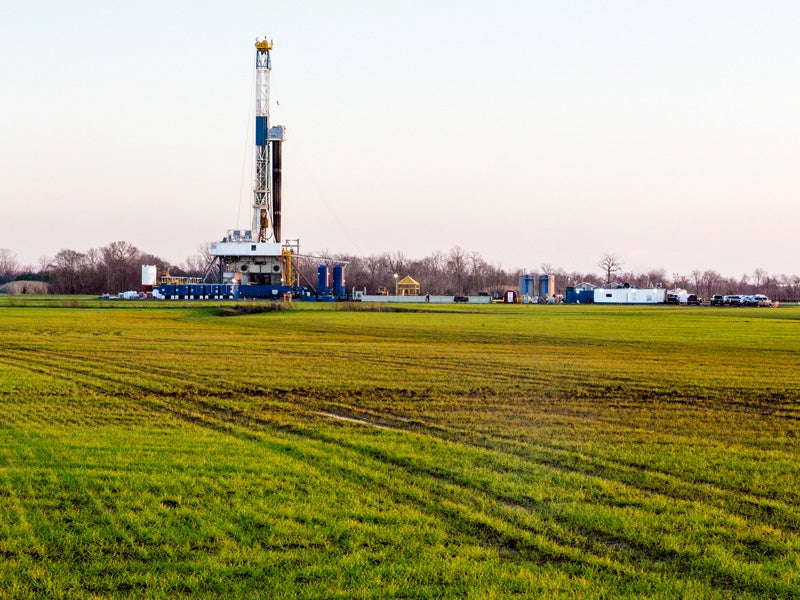New Legislation Would Close Loopholes to the Oil and Gas Industry
Today, four members of the House of Representatives proposed measures to reestablish nationwide fracking laws that would make oil and gas development safer for all Americans.

This page was published 10 years ago. Find the latest on Earthjustice’s work.
From the Cuyahoga River catching fire to Rachel Carson’s findings on the detrimental effects of pesticides the 1960s and 70s brought about serious awareness of dire environmental problems. This awareness culminated in the creation of some of our bedrock environmental laws: the Clean Air Act, Clean Water Act and Safe Drinking Water Act. However, today water coming out of the sink faucet still catches fire, and people and animals are still getting sick. The creation of these laws was supposed to stop these occurrences, so what happened?
Over the last few decades, the oil and gas industry has lobbied for, and obtained, special exemptions and loopholes that have allowed the unregulated expansion of oil and gas development and a free pass to ignore vital health and environmental safeguards. At the same time, an unprecedented number of drilling projects have spread across the country, overwhelming entire communities with health and safety hazards.
Scientific studies show that hormone-disrupting chemicals linked to cancer, infertility and a slew of other health problems have been found in water samples collected at and near hydraulic fracturing sites. Often these operations take place near densely populated residential areas, homes, schools and playgrounds. According to an article in the Wall Street Journal, since 2000 more than 15 million Americans have lived within a mile of a drilled well. As a result, many Americans live in communities at risk for “fraccidents” like being exposed to contaminated drinking water and toxic air pollution.
To protect their right to clean air and water from risky fracking activity, entire communities and individual citizens are calling for the closure of these loopholes. Today, Congress is once again responding to their call. Congressional Representatives Matt Cartwright (D-PA), Jared Polis (D-CO), Diana DeGette (D-CO) and Jan Schakowsky (D-IL) have proposed measures to re-establish nationwide fracking laws that would make oil and gas development safer for all Americans.
The FRAC, BREATHE, FRESHER, and SHARED Acts would close several loopholes that allow industry exemption from our nation’s bedrock environmental laws. This conglomerate of common sense bills, known as the “Frack Pack,” would ensure that oil and gas operations adhere to the same federal safe-practice laws as other potentially harmful industrial activities.
The bills within the “Frack Pack” would each address a loophole in an already existing federal standard. Specifically,
- The FRAC Act would close the Halliburton loophole to the Safe Drinking Water Act, allowing the EPA to protect drinking water from contamination caused by drilling and fracking, requiring disclosure of fracking chemicals to the public, and helping to guard against earthquakes linked to fracking.
- The BREATHE Act would hold the oil and gas industry responsible for emitting significant amounts of toxic air pollutants by terminating loopholes in the Clean Air Act. Due to a loophole, closely associated wells and related facilities are exempt from meeting the certain air quality standards for emissions of hazardous air pollution.
- The FRESHER Act would terminate the loophole in the Clean Water Act that endangers water quality near oil and gas operations. This bill would hold oil and gas companies accountable to the same standards as other industries and require them to obtain stormwater runoff permits for construction and drilling activities.
- The SHARED Act would amend the Safe Drinking Water Act to require groundwater quality testing throughout the hydraulic fracturing process. These tests would be conducted prior, during and after the operation in order to more closely monitor groundwater systems for any indication of hazardous substances, pollutants, contaminants or other factors.
Simply put, the proposed bills would hold the oil and gas industry to par with other harmful industrial activities by ending special exemptions from essential environmental laws. In a press release, representative Polis (D-CO) highlighted that this legislation would “restore a basic, national safety net that will ensure transparency within the industry and safeguard our communities.”
Americans deserve protections that only the federal government can offer, especially from the toxic practices of the oil and gas industry. The “Frack Pack” would begin the process of addressing these industry inadequacies and provide the millions of people living near oil and gas development sites some peace of mind.
For more information on the “Frack Pack,” please see our press release.
Established in 1989, Earthjustice's Policy & Legislation team works with champions in Congress to craft legislation that supports and extends our legal gains.